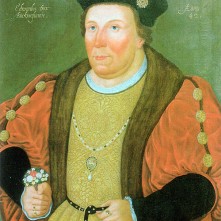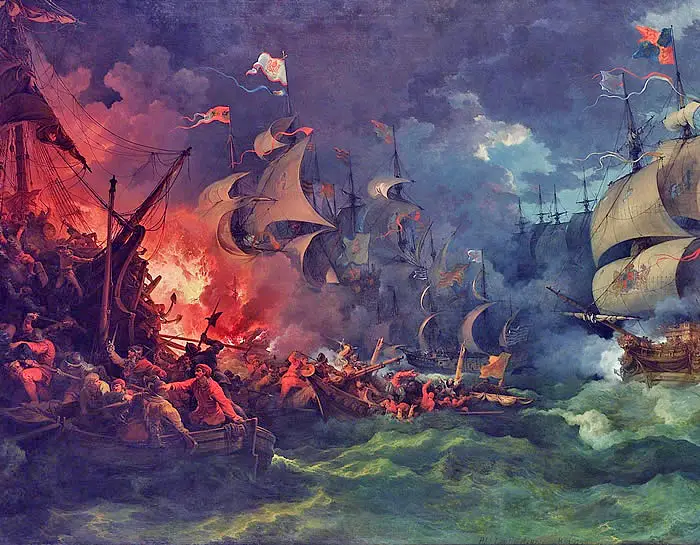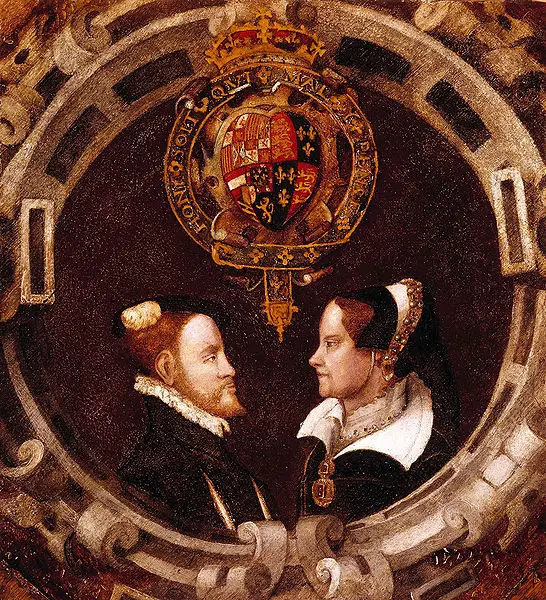27 July
1534 – Murder of John Alen, Archbishop of Dublin, in Artane. Alen, his chaplains and servants, were murdered by the men of Thomas Fitzgerald, Baron Offaly, after their ship ran aground near Clontarf and they were taken prisoner. He was buried in a pauper's grave.
1550 – Baptism of George Whetstone, writer, at St Lawrence, Old Jewry. His works included “The Rocke of Regarde”, “The Honorable Reputation of a Soldier”, “Heptameron of Civill Discourses” and the two-part play “ Promos and Cassandra”, which was a source for Shakespeare's “Measure to Measure”.
1553 – Edward VI's former tutor and principal secretary, Sir John Cheke, was sent to the Tower for his part in putting Lady Jane Grey on the throne. He was released in spring 1554.
1578 – Death of Jane Lumley (née Fitzalan), Lady Lumley, translator, at Arundel Place in London. She was buried at St Clement Danes, the Strand, but later moved to a tomb in Cheam, Surrey. Jane is known as the first person to translate Euripides's “Iphigeneia at Aulis” into English, and she also translated various orations of Isocrates from Greek to Latin. Her work can be found in the British Library.
1593 – Execution of William Davies, Roman Catholic priest and martyr, at Beaumaris Castle on the Island of Anglesey. He was hanged, drawn and quartered. Davies was beatified in 1987 by Pope John Paul II.
1622 – Death of Thomas Knyvett, Baron Knyvett and Gentleman of the Bedchamber to Queen Elizabeth I and James I, at his home in King Street, Westminster. He was buried in Stanwell Church in Middlesex.
28 July
1488 – Death of Sir Edward Woodville, courtier and soldier, at the Battle of St Aubin du Cormier. Woodville was the brother of Elizabeth Woodville, consort of Edward IV.
1508 – Death of Robert Blackadder, Archbishop of Glasgow and administrator in the governments of James III and James IV. He died at sea, between Venice and Jaffa, while travelling on a pilgrimage to Jerusalem.
1540 - Thomas Cromwell, Earl of Essex, was executed by being beheaded on Tower Hill. Cromwell had been arrested on 10th June 1540 at a council meeting, and a bill of attainder was passed against him on 29th June 1540 for the crimes of corruption, heresy and treason.
1540 – Marriage of Henry VIII and Catherine Howard at Oatlands Palace. Henry's marriage to his fourth wife, Anne of Cleves, had been annulled just a few days before, so the wedding was a low key affair.
1540 – Execution of Walter Hungerford, Baron Hungerford of Heytesbury for treason. He was beheaded on Tower Hill and the charges included buggery and having dealings with witches.
1543 – Burnings of the Windsor Martyrs - Robert Testwood, Anthony Pearson and Henry Filmer – for heresy in Windsor, on waste-ground just north of the castle.
1563 – Ambrose Dudley, Earl of Warwick, surrendered Le Havre to the French after a siege which had lasted since 22nd May.
1585 – Death of Francis Russell, 2nd Earl of Bedford, Privy Councillor and diplomat, at his home in Russell Street, the Strand. He was buried at the chapel of Chenies, his seat in Buckinghamshire.
1588 – Five hell-burners were ordered to be sent amongst the galleons of the Spanish Armada at Calais. The high winds at Calais caused an inferno which resulted in complete chaos, and the Armada’s crescent formation was wrecked as galleons scattered in panic.
1591 – Execution of William Hacket, puritan and alleged prophet, at Cheapside Cross for treason after he had pierced a portrait of Elizabeth I “in the very place, representing her royall heart”, and defaced her coat of arms.
29 July
1504 – Death of Thomas Stanley, 1st Earl of Derby, husband of Lady Margaret Beaufort, and stepfather of Henry VII, at Lathom. He was buried at Burscough Priory. It is thought that it was Stanley who placed Richard III's crown on his stepson's head at Bosworth.
1509 – Birth of George Neville, son of Richard Neville, 2nd Baron Latimer, and his wife, Anne Stafford. Neville was Archdeacon of Carlisle and Rector of Salkeld, Spofforth and Morland.
1565 – Marriage of Mary, Queen of Scots, and Henry Stuart, Lord Darnley, at Holyrood Palace (the Palace of Holyroodhouse), Edinburgh.
1573 – Death of John Caius, scholar, Physician to Edward VI, Mary I and Elizabeth I, and founder of Gonville and Caius College, Cambridge, at his home near St Bartholomew's Hospital.
1588 - The Battle of Gravelines. The English fleet was victorious against the Spanish Armada.
1589 – Hanging of Agnes Waterhouse, one of the Essex Witches, at Chelmsford in Essex.
1591 – Death of Edmund Coppinger, puritan and alleged prophet, after a 7-8 day hunger strike. Coppinger was an associate of William Hacket, who had been executed the day before.
30 July
1540 – Executions of Catholic martyrs Thomas Abell, Edward Powell and Richard Fetherston for refusing to acknowledge the royal supremacy. They were hanged, drawn and quartered at Smithfield.
1540 – Burnings of religious reformers Robert Barnes, William Jerome and Thomas Garrard at Smithfield for heresy.
1550 – Death of Thomas Wriothesley, 1st Earl of Southampton, at Lincoln House in Holborn. He was buried in St Andrew's Church, Holborn, but then moved later to Titchfield. Wriothesley served Henry VIII as Lord Privy Seal and Lord Chancellor.
1553 - Princess Elizabeth left her new home, Somerset House, to ride to Wanstead and greet her half-sister, Mary, England’s new queen.
1563 – Birth of Robert Parry, writer and diarist, at Tywysog in Debighshire, North Wales. His works included “Moderatus: the most Delectable and Famous Historie of the Black Knight”.
1570 – Burial of Sir William Godolphin, soldier, at Breage.
1588 - The wind changed and the remaining ships of the Spanish Armada were forced northwards and scattered. The wind became known as the “Protestant wind” because people believed that God had sent this wind to protect England from the Catholic Spanish Armada. Later, when it was obvious that the Spanish Armada had been defeated, medals were struck to celebrate and these medals were inscribed with “Flavit Jehovah et Dissipati Sunt“, meaning “Jehovah blew with His wind and they were scattered”. The wind certainly helped the English fleet.
31 July
1544 - The future Elizabeth I wrote her earliest surviving letter to her stepmother, Catherine Parr. It was written in Italian and in a beautiful italic hand.
1549 – Death of Edmund Sheffield, 1st Baron Sheffield, in Norwich. It is said that he was killed by a butcher called Fulke, while serving in the royal army against the rebels of Kett's Rebellion. Apparently he stumbled into a ditch and then was killed by a blow from Fulke. Sheffield was buried in St Martin's at the Palace, Norwich.
1574 – Death of John Douglas, Archbishop of St Andrews and educational reformer, in St Andrews. He was buried in the public cemetery. It is said that he died in the pulpit.
1 August
1534 – Germain Gardiner wrote a tract against reformer and martyr John Frith entitled “A letter of a yonge gentylman named mayster German Gardynare, wherein men may se the demeanour and heresy of John Fryth late burned”.
1545 – Birth of Andrew Melville, Scottish theologian and Principal of St Mary's College, St Andrews University, at Baldovy, Angus.
1555 - Apothecary, alchemist and medium Sir Edward Kelley was born on this day in 1555 in Worcester.
1556 – Burning of Joan Waste, a blind woman, in Derby for heresy after she refused to recant her Protestant faith.
1596 – Death of John Astley (Ashley), courtier, probably at Maidstone in Kent. He was buried there at All Saints' Church. Astley served Elizabeth I as a Gentleman of the Privy Chamber, Master of the Jewel House and Treasurer of the Queen's Jewels and Plate. He was also married to Katherine Astley (née Champernowne), Elizabeth I's former governess and Chief Gentlewoman of the Privy Chamber.
1605 – Death of Sir Edmund Anderson, Judge and Chief Justice in Elizabeth I's reign, in London. He was buried in the parish church at Eyworth.
2 August
1514 – Edward Stafford, Duke of Buckingham, was granted a licence to found a college at Thornbury.
1521 – Cardinal Wolsey arrived in Calais to act as peacemaker and preside over a conference aiming to put an end to the fighting between France and the Empire.
1553 – Elizabeth greeted her half-sister, the newly proclaimed Queen Mary I, in London.
1555 – Burning of James Abbes, Protestant martyr, in Bury for heresy.
1556 – Death of George Day, Bishop of Chichester. He was buried in Chichester Cathedral.
1581 – Burning of Richard Atkins, Protestant martyr, before St Peter's in Rome. It is said that as he was taken to St Peter's, his back and breast were burned by men holding torches, and that his right hand was then cut off and his legs burned first to prolong his suffering.
1589 – Death of Henry III of France after being stabbed in the abdomen by Jacques Clément, a fanatical Dominican friar, the day before. He was buried at the Basilica of Saint-Denis.
1595 – The Battle of Cornwall. Spanish forces landed at Mount's Bay and the English militia fled, allowing the Spanish troops to move on and burn Penzance, Mousehole, Paul and Newlyn.
1596 – Burial of Thomas Whithorne, composer and autobiographer, at St Mary Abchurch, London. Whithorne was Chapel Master to Archbishop Matthew Parker.
1601 – Death of George Eyste, author, town lecturer, preacher and Vicar. He died in Bury St Edmunds, Suffolk, and was buried in his church, the Church of St Mary.
1605 – Death of Vice Admiral Sir Richard Leveson in the Strand, London. He was buried in St Peter's Church, Wolverhampton.







Leave a Reply